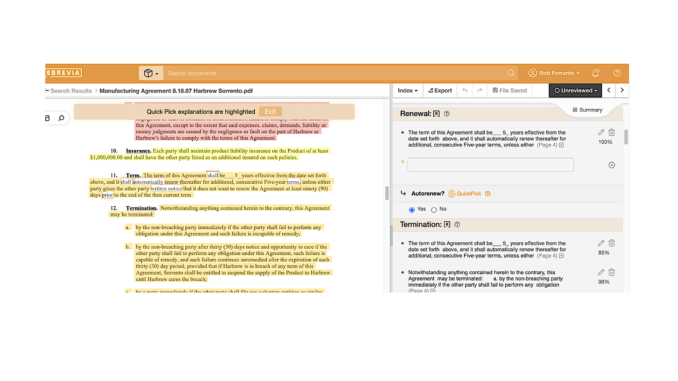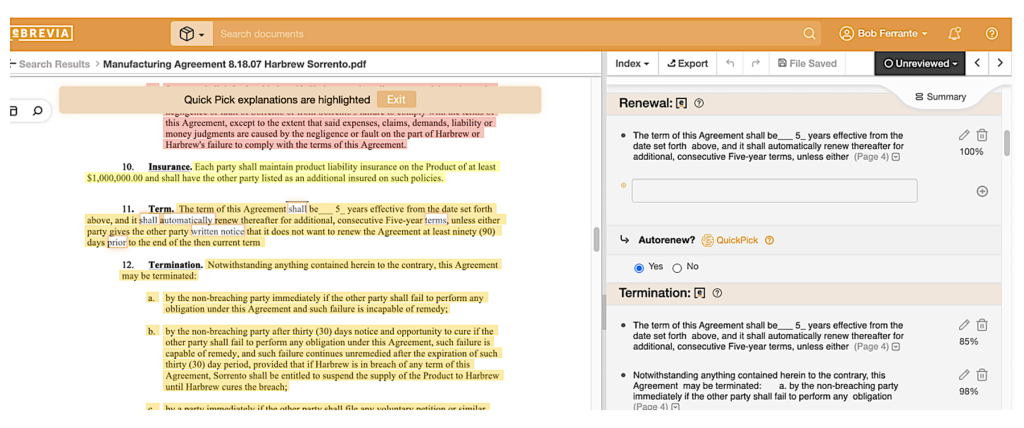
eBrevia has launched QuickPick, a contract analytics feature that can automatically provide answers to a selection of pre-set questions, speeding up the review process. It joins a growing number of companies providing a Q&A contract review capability.
The genesis of QuickPick directly stemmed from a pain point they heard from their customers: how to take unstructured data in contracts and create more structure around it, the company said.
For example, a company doesn’t want to extract contract data and then have to sift through it to find if the located terms meet their playbook, as that slows the review process.
With this approach, pre-set questions may be yes or no in response, or questions that will provide specific responses to most of the key things you would normally look for with that type of contract or use case.
Using QuickPick you could ask something very direct such as ‘Is there a termination date?’ and get a yes/no answer, but also more complex questions such as: ‘Does assignment require consent? What exceptions to confidentiality exist? Or, what actions are covered under force majeure?’
These results are then listed on the right side of the screen (see image below) along with confidence scores in terms of the accuracy of the answer. Where the answers have come from is also then highlighted on the left of the screen in the contract text, so the reviewer can see the source.

Artificial Lawyer asked the company why it had taken this approach, rather than seeking to allow users to input ‘free-form’ natural language questions into the system as people went along with a review? The reason is that this ‘answer-focused’ approach is more reliable, they said.
Ned Gannon, President of eBrevia, which is part of US risk and compliance service company DFIN, told Artificial Lawyer: ‘The focus of the QuickPick feature is a bit different than natural language questions and is what we believe is a more reliable approach.
‘The particular language in the question does not influence the AI’s determination, but it is rather using ML and NLP techniques to match contract language with the appropriate answers based on training, as long as the answers are in a yes / no, dropdown (exclusive picklist), or Multi-Select fields (non-exclusive picklist).
‘Since the focus of the AI is on the answers, rather than the questions, users are not restricted by an AI’s ability to properly interpret their question (and have full flexibility to label the questions as they like).
‘This approach also allows the software to answer questions about a particular provision in a very granular way, as the software’s AI will automatically determine answers by parsing specific words and phrases within a particular provision. The system points to the specific words in the provision that most influenced its determination in a friendly UI.’
I.e. the NLP’s work is focused on finding the answer, rather than having first to try and figure out what the question that you’ve just typed in may mean, which could be phrased in a dozen different ways.
It also removes the need for the reviewer to try and work their way through a contract all on their own, as the company or law firm already has the key questions built into the process. This should not only save time, but could also reduce risk due to a more standardised approach. E.g. you won’t have 10 reviewers all approaching a set of documents in quite different ways.
Is this a big deal? Other companies in the doc analysis field also already provide variations on the same question and answer approach. Some have focused strongly on the ability to ask questions as you go along in a free-form natural language way, others have taken a similar path and focused on pre-set questions most likely to occur in commercial contracts.
This is what eBrevia says on that point: ‘Though other players in the space have tried to address this issue in the past, eBrevia’s solution to this customer pain point goes much further than other products on the market. The AI provides answers to customer questions, but also provides evidence along with those answers, so that the customer can then quickly audit and verify the AI’s work. Key provisions related to the structured data are provided right in the eBrevia interface for easy review by the customer.’
Ultimately, the proof of the pudding will be in the user experience. As more companies offer similar or overlapping product features, much will depend on how easy to use the software really is and of course: how confident the reviewers feel about the outputs in terms of accuracy. eBrevia is hoping its approach meets both of these needs.
Interesting to see eBrevia catching up with others in the market with this feature. Sounds like it’s a carbon copy of Kira’s Answers and Insights feature which is no bad thing.